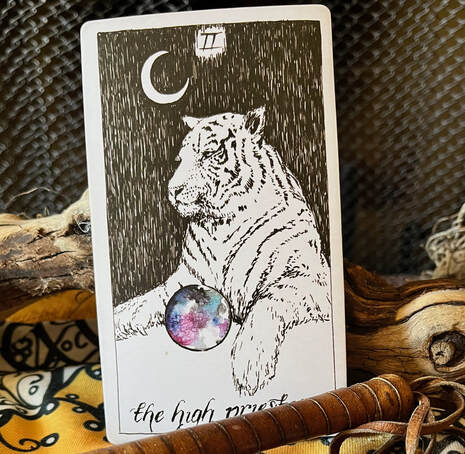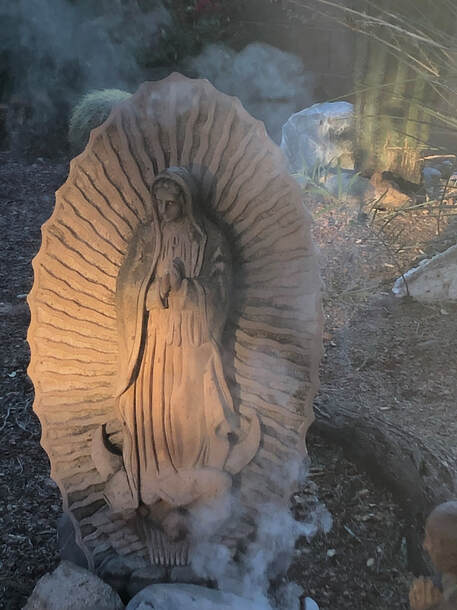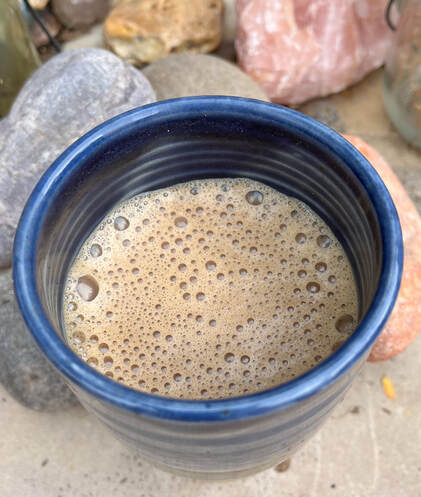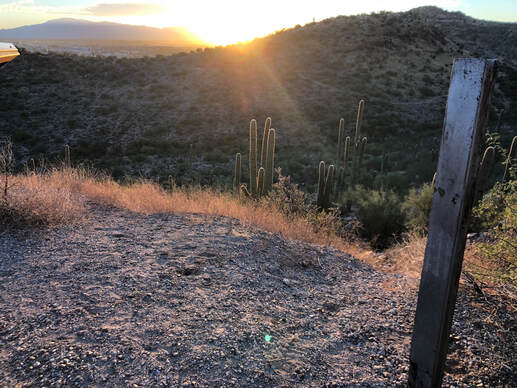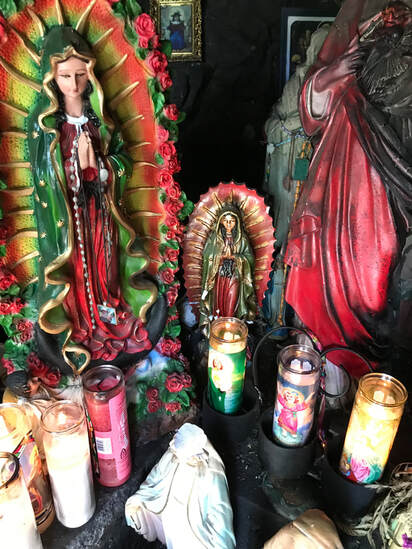A Story for Tonantzin Guadalupe and the People Nighttime prayers to Tonantzin Guadalupe. Photo by author. Nana Coyo never slept on the night before the day of remembering. As soon as the sun had dropped with certainty behind the western mountains, she arranged herself on a folding chair outside in her backyard. She placed her feet on a hot water bottle and heaped a mountain of wool blankets over herself. At her side, she kept a thermos of steaming atole with piloncillo and chocolate for wakefulness. There was nowhere she’d rather be. This year, the cycles of Earth and Cosmos arranged for the Moon to be wearing her darkest cloak. Nana Coyo hummed and muttered. She sang as the sky revealed what people nowadays would refer to as secrets. Nana Coyo knew better. Secrets are simply memories retained, she’d tell her adoptive son Lázaro. When Lázaro was younger, he’d furrow his brow and complain about Nana Coyo and her ways of explaining things. Why can’t you just talk like a normal person, he’d say. She would laugh and tug at his ear. “Te estoy entrenando a los oídos, hijo mío.” One day he would know how to listen. Now that Lázaro’s hair was greying and Nana Coyo was practically old enough to join the stars, he felt a longing in his bones to sit outside with her. He could barely make out Nana Coyo’s silhouette against the blackness of the night. He followed the sound of her voice, a trail of vocalizations beyond any language he recognized. Clicks and trills. Hoots and whistles. Murmurs like the wings of hummingbirds. As his eyes adjusted to the dark, he saw how starlight outlined her huddled figure. Without a word, Lázaro set up his folding chair next to Nana Coyo. She patted his knee. He could feel a smile in the warmth of her hand. She poured him a cup of atole. He breathed in the smells of roasted corn ground into flour, boiled in water, and whisked into a frothy porridge. As he raised the cup to his mouth, he could practically taste the hints of cinnamon and chocolate. He felt Nana Coyo’s bony fingers gently intervene, pulling back his cup before he could take a sip. “Antes de todo, una pruebadita para la Madrecita.” Like she was assisting a child, Nana Coyo held Lázaro’s hands in her own. She guided them down to the ground, where she tipped the cup and spilled out a taste of atole onto the cold and hardened dirt beneath their feet. She whispered to the ground and sighed with satisfaction. “Ahora sí, mi amor. Drink up.” And he did. They sat for hours. Nana Coyo sang. She stretched her legs. She clapped her hands. She stomped her feet. She settled into a chorus of sounds that only tall grasses know how to make in the wind. Together, they drank the atole. Without even intending it, Lázaro turned over his consciousness to the dark sky. He forgot that he was awake, staring into the starry abyss, with only the smell of corn and the tug of gravity to remind him that he was still a terrestrial creature. At some point during the night, he realized that he could understand the sounds being spoken by Nana Coyo. Was she speaking Spanish? Was it English? He couldn’t quite tell, but the words began to descend into him like the warming spread of awareness through his body. “The Corn Mothers came to us long ago, mijo. They seeded themselves into us, generation after generation. Beings as big as the stars became morsels of nourishment. In Madre Maíz, they came as clusters of constellations, all the colors of light, the energy of nuclear fusion—the glow of blue, yellow, red, orange, white, and every glimmer in between. They joined with the stones and made their way into our bones, our cells, the spiraling ladders of the fabric of our being. They fed us with the food of remembering because they knew a different kind of darkness would descend on the land. It is not the blackness of the night but the disease of forgetfulness. They knew there would come a day when we would eat and never be satiated. Ravenous, we would devour everything in our path, as if we had no memories.” Nana Coyo poured the last of the atole into Lázaro’s cup. “The Mothers are as close to you as your body. On this night before the day of remembering, drink and eat, mi amor. See them adorned in starlight and radiating with power. Receive their ripened bellies. Be filled by them.” With that Nano Coyo cupped Lázaro’s head in her hands. She turned his gaze toward the Eastern sky. Against the mountains, the horizon began to define itself as the black night softened. A shard of light pierced through the worlds and illuminated the shoulders of the mountains. In that moment, Lázaro felt his own clenched heart cleave open. His body spilled to the ground. In heaving sobs, he wrapped himself around Nana Coyo’s feet. He gave his waters to her body and to the body of the Earth. He offered his tears, his spit, the vapors of his breath. When he finally came to stillness, Nana Coyo pulled out her left foot and gently rested it on the small of Lázaro’s back. She applied the slightest pressure, and he breathed in deeply, as if reacquainting himself with air. They rested this way, the two of them. Together at the precipice between worlds, they greeted the day of remembering. Read other stories about Lázaro and Nana Coyo:
Lázaro and Nana Coyo Praise the Monsoons Lázaro and the Santito Rescue Mission
0 Comments
High priestess on my altar. Tarot card by Kim Krans, The Wild Unknown Tarot. Photo by author. The High Priestess Comes to Me as a TigerLast night I dreamt that I was bathing my baby in a pool of water. A tiger appeared out of the darkness and stepped into the water. She walked slowly, deliberately. Her eyes were on me.
She came right up to me and brushed up against my body. She leaned into me. I could feel her rib cage against my back. My breath caught as I felt the enormity of her being. Muscles of solid mass. Fierceness. Strength of a magnitude beyond anything I’d known. In an instant—less than an instant—she could decide whether my baby and I lived or died. I loved this tiger even as I feared her. My body trembled, and I was more awake than I’d ever been. I looked at my baby, continuing to bathe her. Each drop of water mattered. Each stroke of her head. "Here we are together," I told her. “Right now.” I felt the kind of joy that makes hearts weep. "One day the tiger will eat us," I said. At that, the tiger pulled away and walked out of the pool. Water dripped from her body. I don’t remember if she turned around to look back at me. All I could feel was that place on my back where she’d leaned into me. She’d imprinted herself onto me. When I close my eyes, I can still remember her warmth. I want you to claim your joy now, she said. This is not the time for waiting. Copal Offerings. Photo by author. The Troubadour Gathers Them Under Her Crescent MoonWritten in honor of Tony Enciso.The people set out on their pilgrimage. They came from all directions. Some only had to walk across the street or drive across town. Others came from cities hundreds of miles away. They traveled by plane and by car. Some caravanned and others journeyed at their own pace.
If they were coming from the north—as many of them were—the only way to their final destination was through that odd stretch of highway that ran 102 kilometers from Tucson to the international border at Nogales. It was the only length of highway in the U.S. that was measured in kilometers. The highway wound through the Santa Cruz River Valley, where the contours of mountains and river had been guiding the movements of creatures for thousands of years. In the days leading up to their journeys, the people kept a close watch on the weather. Their bright screens reflected back to them a perplexing forecast: a string of sunny, even balmy days followed by 36 hours of rain, wind, and frosty temperatures. After that, a return of the sun. The people furrowed their brows at their phones, refreshing the weather screen every few hours, only to see the chance of rain increase from 30 to 60 to 80 percent. They shook their heads and wondered aloud what the santitos were thinking to bring bad weather on just the two days of their pilgrimage. But the people knew better—even if they didn’t say it out loud. Deep down in their hearts they knew what the weather did—that it wasn’t just every day that one of the great troubadours died. How could the people expect that theirs would be the only ceremony? The elements would be gathering too. So it came to pass exactly like the weather reports said. Between the 9th and the 10th of December, a cold front moved in, and it rained all along the Santa Cruz River Valley in southern Arizona. It wasn’t a downpour, but rain that was steady and sure-footed enough that the riverbed ran wet with rivulets. The winds roused the yellowing cottonwoods into a chorus. Wisps of clouds veiled the peaks of the Santa Rita Mountains, like the lacey head coverings of viejitas who’d lost their beloveds. As their travels funneled them onto that final river valley stretch, the people didn’t need signs or kilometer markings to tell them how close they were to arriving. The profiles of the mountains and turns in the road were as familiar to them as the creases on their palms. Their eyes grew moist, and their hearts began to swell the nearer they got. They could hear their troubadour’s voice in their ears and his melodies in the wind. The troubadour called them all home, down the familiar streets of this city named after a walnut grove that had vanished long ago. Some drove the long, slow route along the train tracks and arroyo. Others emerged onto Western Avenue and traveled through the old neighborhoods, along the hills that, a century ago, had hosted a camp for Buffalo Soldiers and infantrymen that numbered in the thousands. Finally, there were those who stayed on the highway until it came to an end near the border wall. They all found their way to that road where the church was poised on the top of the hill. Where the people—now fully peregrinos—gathered in their dark coats and sweaters, filling every available seat and aisle. The troubadour’s guitar, now silent, stood at the foot of the altar, surrounded by flowers. The people sang for seven hours that day. They sang for the troubadour. They sang for themselves. They sang in grief. They sang in joy. They sang to their memories. They sang to the ache in their hearts. They sang to the old ones. They sang to the young. They sang to the saints. They sang to the sinners. They sang to life. They sang to death. They sang to the space in between worlds. They sang with the mountains. They sang with the rivers. They sang with the wind. They sang with the vultures. They sang with the crows. They sang with the cypress trees. They sang with the sunset. They sang with the night. They sang to the stars. They sang to the bright crescent moon that rose in the black sky. They sang to the wise man who’d lived with a fool’s tender heart. They sang to the voice that had always sung to them. They sang until they could sing no more. After all the tables had been cleared and the leftover food sorted and stored, the people packed their bags. They stepped into the dark and made their way onto the steep stairway that led up the hill, back to the church parking lot. For a moment, they stopped in their tracks and looked at each other. "Did you hear that?" they asked. In between flourishes of wind, they heard tendrils of song drifting through the night. With their senses piqued, they continued their march up the stairs. When they reached the top, they stood before the church on the hill, its candles ablaze and the doors wide open, voices pouring out. They smiled and nodded. Of course! These were the nights of song to the Great Mother. La Reina. La Virgen. These were her times. Then, the troubadour’s eldest brother spoke the words everyone knew: “Aquí estuviera mi hermano.” A soft recognition descended upon them like starlight. It shimmered and it fluttered down into their hearts. Because on this dark, cold night warmed by candles, filled with the mingling of red roses and music, their beloved troubadour—even in death—had gathered them together in song and delivered them to this threshold of days. There they stood, perched on a hill, under her crescent moon. There they stood in this strange town poised between uncertain worlds—a place they called home, regardless of where they lived now. There they stood exactly 490 years into the story of another earthen-skinned man—most likely a troubadour in his own right—who had greeted this Lady with his raw and broken heart. That’s when they knew their troubadour would be their guide in the times to come. Night by night. Day by day. In song. Coatlicue's Cup of Chocolate. Photo by author. Coatlicue's Cup: |
|
©2023 Alicia Enciso Litschi, The Wayward Curandera
All rights reserved. Contact me at [email protected] |
Proudly powered by Weebly

